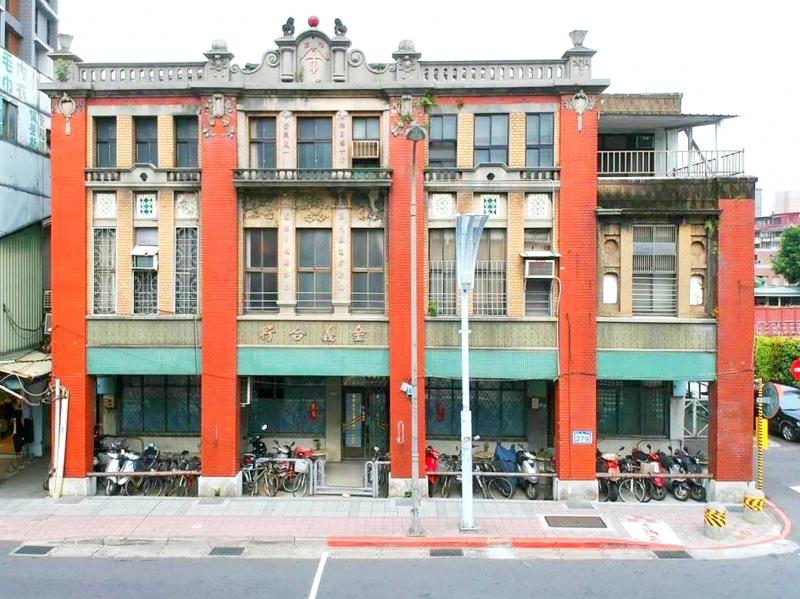The Chin Yi Ho (金義合) building opposite the Wanhua Train Station was on Friday unanimously approved by the Taipei City Government’s Cultural Asset Review committee as a cultural heritage site.
The building, which houses a store and the family residence of a local magnate named Chen Yi-tu (陳義塗), was built in 1927 and played a great part in the establishment of the Chen family’s commercial empire during the Japanese colonial period.
In the past few years, the family had intended to knock down the building and construct a building for commercial and office use.

Photo copied by Yang Hsin-hui, Taipei Times
However, they backed away from the idea, saying that the building had great significance to the family.
The building was initially a glass and ceramics workshop, and was later the headquarters of the family’s foray into the petrochemical industry.
Architectural tastes, such as Baroque-style reliefs and Majolica-style glazed ceramic tiles, of the time had a great influenced on construction of the building.
Designed to function as a residence and workspace, the building has offices, a room set aside for the worship of the ancestors of the Chen family, as well as one of the few remaining indoor gardens built during the Japanese colonial era.
Committee members Chao Chin-yung (趙金勇) and Kuo Chiung-ying (郭瓊瑩) on Friday said that the family and the building had preserved techniques and documentation of the family’s method of making ceramics, so conservation of the building would boost the city’s cultural assets.
Architect Lu Ta-chi (呂大吉), who was commissioned by the Chen family, said that maintenance and repairs, as well as repurposing of the building, would take roughly half a year and cost about NT$80 million (US$2.83 million at the current exchange rate).
Financially speaking, converting the building to an office or commercial building would be best, but that would increase the risk of later generations selling the estate when they no longer have use for it, Lu said.
The family felt that it was best to consolidate opinions now, as most of them had lived in the building, he said.
The consensus was to conserve the building, Lu said.
It will primarily be leased out for cultural uses and could double as an auditorium, he said, adding that should there be the need, the building could also be offered to the community for gatherings.

‘DENIAL DEFENSE’: The US would increase its military presence with uncrewed ships, and submarines, while boosting defense in the Indo-Pacific, a Pete Hegseth memo said The US is reorienting its military strategy to focus primarily on deterring a potential Chinese invasion of Taiwan, a memo signed by US Secretary of Defense Pete Hegseth showed. The memo also called on Taiwan to increase its defense spending. The document, known as the “Interim National Defense Strategic Guidance,” was distributed this month and detailed the national defense plans of US President Donald Trump’s administration, an article in the Washington Post said on Saturday. It outlines how the US can prepare for a potential war with China and defend itself from threats in the “near abroad,” including Greenland and the Panama

The Chinese Nationalist Party (KMT) is maintaining close ties with Beijing, the Democratic Progressive Party (DPP) said yesterday, hours after a new round of Chinese military drills in the Taiwan Strait began. Political parties in a democracy have a responsibility to be loyal to the nation and defend its sovereignty, DPP spokesman Justin Wu (吳崢) told a news conference in Taipei. His comments came hours after Beijing announced via Chinese state media that the Chinese People’s Liberation Army’s Eastern Theater Command was holding large-scale drills simulating a multi-pronged attack on Taiwan. Contrary to the KMT’s claims that it is staunchly anti-communist, KMT Deputy

RESPONSE: The government would investigate incidents of Taiwanese entertainers in China promoting CCP propaganda online in contravention of the law, the source said Taiwanese entertainers living in China who are found to have contravened cross-strait regulations or collaborated with the Chinese Communist Party (CCP) could be subject to fines, a source said on Sunday. Several Taiwanese entertainers have posted on the social media platform Sina Weibo saying that Taiwan “must be returned” to China, and sharing news articles from Chinese state media. In response, the Mainland Affairs Council (MAC) has asked the Ministry of Culture to investigate whether the entertainers had contravened any laws, and asked for them to be questioned upon their return to Taiwan, an official familiar with the matter said. To curb repeated

Myanmar has turned down an offer of assistance from Taiwanese search-and-rescue teams after a magnitude 7.7 earthquake struck the nation on Friday last week, saying other international aid is sufficient, the National Fire Agency said yesterday. More than 1,700 have been killed and 3,400 injured in the quake that struck near the central Myanmar city of Mandalay early on Friday afternoon, followed minutes later by a magnitude 6.7 aftershock. Worldwide, 13 international search-and-rescue teams have been deployed, with another 13 teams mobilizing, the agency said. Taiwan’s search-and-rescue teams were on standby, but have since been told to stand down, as